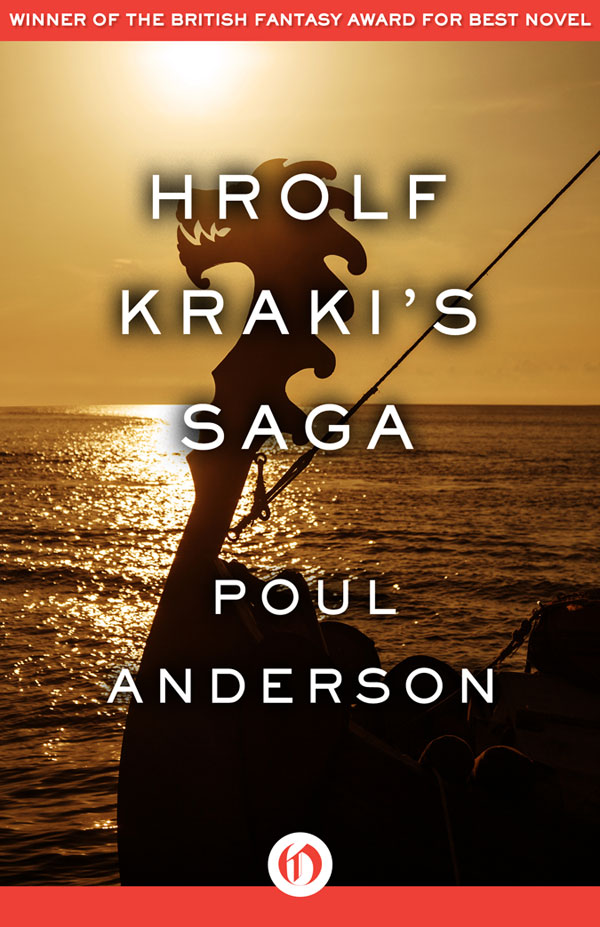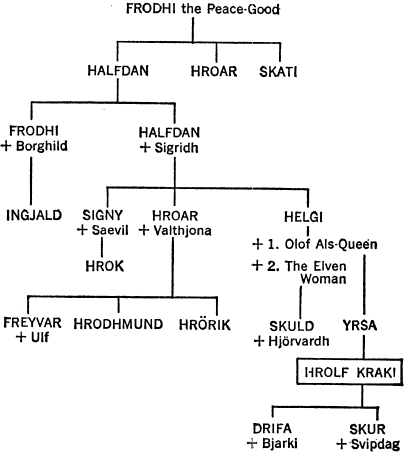Hrolf Kraki's Saga



FRESH EBOOK DEALS, DELIVERED DAILY
BE THE FIRST TO KNOW—
NEW DEALS HATCH EVERY DAY!
Poul Anderson

To my favorite Finnish spellbinders—
Chelsea Quinn Yarbro and Emil Petaja
A Foreword by Poul Anderson
A book should speak for itself. But since this is not a modern fantasy, you the reader may like to know its background.
In contrast to the
Volsungasaga
, whose core is a story from the Rhineland, the cycle of Hrolf Kraki and his heroes is purely Northern. Once it was widely known and many-branched, deep in the souls and the songs of the folk. But it did not have the same good luck as the tale of Sigmund, Sigurdh Fafnir’s-Bane, Brynhild, and Gudhrun: to get a sinewy prose narrative and to inspire poems which have survived in their entirety. Hence, today it is nearly forgotten. It deserves to be remembered anew.
The germ of it is close in age to that of the
Nibelungenlied
and contemporary with
Beowulf
. In fact, it and the latter throw a great deal of light on each other and include a number of the same people. The most conspicuous example is King Hrothgar, whose hall Beowulf rid of the monsters. In the homeland version he is Hrolf’s uncle Hroar. Enough additional identifications have been made to leave no doubt.
Now this can be dated rather closely. Gregory of Tours, in his
History of the Franks
, mentions a Danish king—whom a slightly later chronicle calls Geatish—Chochilaicus, who fell in the course of a massive raid on Holland. He has to be that lord whom
Beowulf
calls Hygelac and
Hrolf
(and certain other Northern remnants) Hugleik. On that basis, we can say with reasonable confidence that he was indeed a Geat. We are not sure whether this people lived in Jutland or the Göta-land part of Sweden, then an independent kingdom. I think the second is more likely. In any case, since that leader was real, no doubt others were whose names loom far larger in tradition: such as Beowulf and Hrolf themselves.
Hugleik died between 512 and 520 A.D. Thus Hrolf flourished two or three decades later. This was during the
Völkerwanderung
period, when Rome had gone under and the Germanic tribes were on the move, as wild a time as the world has ever seen. We can understand why Hrolf Kraki was gloriously remembered, why the saga tellers generation by
generation brought every hero they could to his court, even if this meant giving less and less of the cycle to the king himself. His reign was—by comparison, anyhow; in story, at least—a moment of sunshine during a storm which raged for centuries. He became to the North what Arthur did to Britain and Charlemagne, afterward, to France. On the morning of Stiklestad, five hundred years later and away off in Norway, the men of King Olaf the Saint were wakened by a skald who chanted aloud a
Bjarkamaal:
one of those lays wherein the warriors of the pagan Dane-King Hrolf were called to their last battle.
Fragments of it have come down to us. We know also the
Bjarkarímur
, a different and late set of verses. In his chronicle of Danish legend and history, the monk Saxo Grammaticus (c. 1150–1206) gives still another poem, in a long Latin paraphrase from which we can only attempt to reconstruct the original. (A sample is in Chapter I of “The Tale of Skuld,” and some other parts have been worked into a form more in period for Chapters II and III.) This book—which likewise includes the oldest extant account of Hamlet—tells the story of Hrolf. In addition we find mention of it in Snorri Sturlason’s
Younger Edda
and
Heimskringla
, the synopsized
Skjoldunga-saga
, and scattered references elsewhere. The principal sources are a few Icelandic manuscripts devoted wholly to the legend. Unfortunately, no copy of these is from before c. 1650, and both the style and the logic leave something to be desired.
All the sources contradict each other, and occasionally themselves, on various points. Moreover, they are too sparse, leave too much unexplained, for the modern reader who is not a specialist in the early North.
I have long wanted to make
a
reconstruction, if not
the
reconstruction: put together the best parts, fill in the gaps, use the old words where they seem right and otherwise find new ones. My gratitude is great to Ian and Betty Ballantine and to Lin Carter for this chance to try.
Many such choices and suppositions must be controversial, or sheerly arbitrary. However, we can leave to scholars the pleasant pastime of arguing over details. To me, the most important questions turned on how the narrative might be made enjoyable to read while staying faithful to its originals.
For instance, from my viewpoint and doubtless yours, too many names begin with
H
- and even
Hr
-. I did not feel free
to change this, unless one of the sources gave an alternative; but I have tried to write so as to minimize the chance of confusion. For similar reasons I have used modern place names throughout, generally the English versions, except for territories like Svithjodh which no longer exist.
A greater hazard lies in the very spirit of the saga. Here is no
Lord of the Rings
, work of a civilized, Christian author—though probably it was one of Tolkien’s many wellsprings. Hrolf Kraki lived in the midnight of the Dark Ages. Slaughter, slavery, robbery, rape, torture, heathen rites bloody or obscene, were parts of daily life. Finns in particular will note the brutality and superstition to which the Scandinavians subjected their harmless people.
*
Love, loyalty, honesty beyond the most niggling technicalities, were only for one’s kindred, chieftain, and closest friends. The rest of mankind were foemen or prey. And often anger or treachery broke what bonds there had been.
Adam Oehlenschläger, writing in the Romantic era, could sentimentalize Helgi, Hroar, and Hrolf. I would not. If nothing else, we today need a reminder that we must never take civilization for granted.
I hope you will bear with that, as well as the necessarily sprawling character of the tale and what we today feel as a lack of psychological depth. The latter merely reflects how those folk thought of themselves. To us, their behavior seems insanely egoistic; but to them, each was first a member of his family and only second—however greedy for wealth or fame—himself. The hero is no one of them, but rather the blood of Skjold the Sheaf-Child, which coursed through many different hearts.
I felt obliged to give you some idea of how those lives and that society worked. Yet my aim was not at a hypothetical historical reality, but a myth. Therefore I have put the narrative in the mouth of a person in tenth-century England, when the cycle would have reached its full development—a woman, who would be less likely than a man to use the spare saga style. Of course, she brings in not just the supernatural, but numerous anachronisms. The Scandinavia she describes is, in most respects, the one she herself knows.
As for personal names, those of the gods are in their
modern forms. Since those of humans are exotic anyway, they have been left in the Old Norse. Spellings have occasionally been modified, though, to make both printing and reading easier. For those readers who care, pronunciations go about as follows, accents always being on the first syllable:
a: Generally broad as in
ah
.
aa: Midway between
aw
and
oh
.
dh: The edh, like
th
in
this
.
ei, ey: As in
rein, they
.
g: Always hard, as in
get
.
gn: Both letters pronounced.
j: like
y
in
yet
.
kn: Both letters pronounced.
ng: Always as in
ring
.
ö: As in German or. roughly, English
oo
in
good
.
oa: Two vowels,
oh-ah
.
th: The thorn, like
th
in
thunder
.
u: Long except when followed by a doubled consonant
(Skuld
vs.
Gunnar.)
y: Like German
ii
or, roughly, English
ee
.
æ: Like German
ä
or, roughly English
eh
.
But never mind any of this unless you are especially interested. All that really matters is the story.
—Poul Anderson
*
At least, the sagas call them Finns, though many of them were doubtless actually Lapps.
Though life is lost, one thing will outlive us:
memory sinks not beneath the mould.
Till the Weird of the World stands, unforgotten,
high under heaven, the hero’s name
.
—The Bjarkamaal


